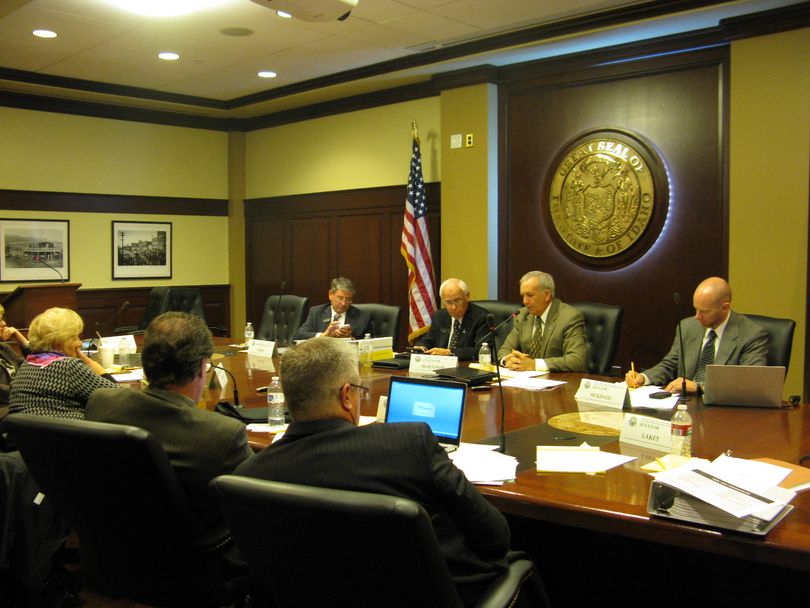Lawmakers mull new Public Defense Commission

A legislative interim committee has agreed on the concept of state Public Defense Commission to help oversee improvements in the state’s spotty and problem-plagued system of criminal defense for indigent defendants. But the senators and representatives also agreed that the new commission should make recommendations to the Legislature on new requirements for qualifications, experience, and performance standards for public defenders, rather than promulgate rules on those items itself. “I don’t know that we can do it all at once,” said Rep. Darrell Bolz, R-Caldwell, co-chair of the interim committee. “It may be a two- or three-year process.”
The panel also is discussing how best to get full-time public defenders in Idaho’s counties, rather than lawyers who also have other cases – which may be higher-paying and draw more of their attention. The problem comes for Idaho’s remote and sparsely populated counties, where, even if they shared a full-time public defender with other counties, travel time could stretch into many hours. Lawmakers on the panel agreed to get more input from counties before their next meeting in January.
The committee’s work opened in August with a stern warning from Idaho Supreme Court Justice Roger Burdick that the state’s criminal defense system for indigent defendants is “broken,” plagued by soaring caseloads, short funding, and lack of qualified, experienced and suitably trained attorneys. Idaho law and the state Constitution require public defenders; Burdick warned that the state is falling short of its own constitutional standard.
Sen. Dean Mortimer, R-Idaho Falls, the interim committee’s Senate co-chairman, said, “We’ve made significant progress.” He said the panel will finalize its commission legislation at its Jan. 8 meeting, and decide whether to propose it during this year’s legislative session. The panel also voted today to recommend the appointment of an additional legislative study group to examine whether cities should help fund the public defender system, in addition to counties and the state. Mortimer said funding issues will be the main focus of the Jan. 8 meeting, including “long-range planning for stable and ongoing funding.” Click below for a full report from AP reporter Rebecca Boone.
Lawmakers: Idaho needs public defense commission
By REBECCA BOONE, Associated Press
BOISE, Idaho (AP) — Members of a legislative committee charged with fixing Idaho's public defense system say they are leaning toward creating a state commission to figure out some of the nuts and bolts of public defender contracts, training needs and oversight.
But co-chairman Sen. Dean Mortimer, R-Idaho Falls, said in the meantime he'd like to see most counties put an end to using part-time contractors to represent poor defendants.
The Legislature appointed the Interim Committee on Public Defense earlier this year after hearing dire warnings from outside legal experts and in-state criminal justice professionals who cautioned that Idaho's current system is unconstitutional and puts the state at risk of costly, drawn-out federal lawsuits.
Currently, counties choose their own approach to public defense. The result is a patchwork: Some contract with the lowest-bidding private defense attorneys, while others have an established public defender office with staff attorneys, investigators and paralegals.
Nearly four years ago, a report from the National Legal Aid and Defender Association found that Idaho isn't adequately satisfying its Sixth Amendment obligations for defendants. That prompted the Idaho Criminal Justice Commission — a group appointed by Gov. C.L. "Butch" Otter — to create a subcommittee to study the matter, which they did for the next three years.
In January, the subcommittee came up with several recommendations to improve parts of the system. Lawmakers then passed bills detailing when children should be appointed attorneys in custody cases and when juveniles should be given public defenders; and clarifying when a poor defendant should be appointed an attorney on the county's dime.
But many problems in the system remain, including an apparent conflict of interest that can arise when a contracted public defender must choose between dedicating more time to lower-paying public defense cases and adding more lucrative private defense clients to their caseload.
During Wednesday's meeting, committee members considered changing Idaho's public defense laws to give counties a few options. Rep. Lynn Luker, R-Boise, said one would be for counties to establish their own office of public defense, or for two or more counties to establish a joint office. That choice could allow counties that have smaller criminal caseloads within the same judicial district to share the costs and benefits of a dedicated office.
Another option would be for counties to individually or jointly contract with a private public defender, under the caveat that the attorney would work full-time on public defense and take no private cases on the side.
But Dan Chadwick, executive director of the Idaho Association of Counties, noted all the options likely would be challenging for Idaho's most rural and remote counties. In those sparsely populated areas with mountainous terrain, it would be difficult for a shared public defender — contracted or otherwise — to have enough work for a full-time job or enough time for a three- or four-hour trip between courthouses.
The committee also is considering creating a state public defense commission to research training needs, oversight and data collection. Mortimer said such a commission could make a recommendation to lawmakers on the amount of funding needed for Idaho's public defense system once that research is complete.
"What we're saying is because they're the experts, we're going to ask them to make those recommendations to the Legislature," Mortimer said.
The committee is expected to meet again in January to finalize its recommendations to lawmakers.
Copyright 2013 The Associated Press
